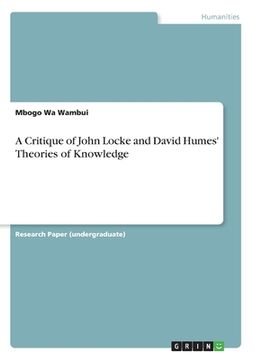Share
A Critique of John Locke and David Humes' Theories of Knowledge
Mbogo Wa Wambui
(Author)
·
Grin Verlag
· Paperback
A Critique of John Locke and David Humes' Theories of Knowledge - Wa Wambui, Mbogo
Choose the list to add your product or create one New List
✓ Product added successfully to the Wishlist.
Go to My Wishlists
Origin: U.S.A.
(Import costs included in the price)
It will be shipped from our warehouse between
Tuesday, July 30 and
Thursday, August 15.
You will receive it anywhere in United Kingdom between 1 and 3 business days after shipment.
Synopsis "A Critique of John Locke and David Humes' Theories of Knowledge"
Research Paper (undergraduate) from the year 2011 in the subject Philosophy - Philosophy of the 17th and 18th Centuries, grade: A, University of Nairobi, language: English, abstract: British philosophers, John Locke and David Hume, are considered empiricists. This is because they based their philosophies on natural science. Both philosophers contributed to the theory of knowledge with Locke coming up with sensations and reflections and Hume coming up with impressions and ideas as the cornerstones of their theories of knowledge. Their theories aim to show us that everything we understand is by virtue of its connection with experience. Experience, therefore is the source of knowledge for these philosophers. This paper looks into empiricism both as a source and method of knowledge. The approach taken is by mirroring John Locke's theory of knowledge with that of David Hume, identifying similarities, influence of Locke on Hume, the differences between them and a critique on the credibility of empiricism, as one of the sources and methods of knowledge. The conclusion arrived at is that empiricist ideas can explain the physical world and what we know of it but there remains rationally derived knowledge. On this account, both empiricism and rationalism are credible sources and methods of knowledge.
- 0% (0)
- 0% (0)
- 0% (0)
- 0% (0)
- 0% (0)
All books in our catalog are Original.
The book is written in English.
The binding of this edition is Paperback.
✓ Producto agregado correctamente al carro, Ir a Pagar.

